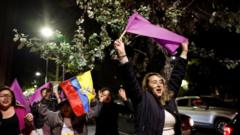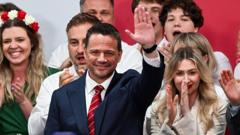In a significant political development, President Daniel Noboa has emerged victorious in the presidential run-off election in Ecuador, ensuring his position for a full four-year term. Noboa, a centre-right leader who took office only in November 2023 following a snap election, touted this win as "historic." His administration has predominantly focused on a robust military response to escalating gang violence, which has positioned the nation as one of the most dangerous in South America.
### Ecuador's Daniel Noboa Secures Re-election in Landmark Vote

### Ecuador's Daniel Noboa Secures Re-election in Landmark Vote
Ecuador's President Daniel Noboa triumphs in the run-off election, solidifying his mandate amid rising insecurity challenges.
In a statement to journalists in Santa Elena, Noboa announced a decisive 56% victory over his left-wing opponent, Luisa González, who has contested the results and claimed electoral fraud without providing substantive evidence. The Ecuadorian national electoral council corroborated Noboa's win, emphasizing a clear lead of over a million votes.
Noboa's administration has been defined by an aggressive stance on crime, marked by a militarized approach to managing violent criminal gangs, which have proliferated in the country. He recently expressed intentions to invite foreign military support in combatting these gangs and wishes to revise constitutional laws to re-establish military bases previously banned under former President Rafael Correa, who is closely associated with his political rival, González.
Despite slight decreases in homicide rates during his presidency, violence remains at alarming levels, as evidenced by more than 780 murders reported in January alone, marking it one of the deadliest months in the nation's history. Polls leading up to the election indicated that public concerns about safety were paramount.
Moving forward, Noboa faces the arduous task of demonstrating the efficacy of his strategies against violent crime while simultaneously addressing rising unemployment rates. In the past year, his approval ratings dwindled, particularly due to a severe drought causing energy shortages across the country. His plans include increased investments in renewable energy, an area of interest given Ecuador's reliance on hydropower.
Noboa's campaign prominently appealed to younger voters with promises of job creation and infrastructure development, supported by modern social media strategies. Following her electoral defeat, González has claimed her party would pursue a recount, asserting that electoral integrity was compromised, an assertion that remains unsubstantiated.
Ecuador remains divided following this election, with many of González's backers longing for the economic stability and reduced poverty levels attributed to Correa's tenure. Noboa's leadership continues to evoke mixed responses, as critics have labeled his administration as authoritarian while also pointing to controversial associations from the past. Addressing this polarization will be crucial for Noboa to foster national unity and stability in the forthcoming term.
Noboa's administration has been defined by an aggressive stance on crime, marked by a militarized approach to managing violent criminal gangs, which have proliferated in the country. He recently expressed intentions to invite foreign military support in combatting these gangs and wishes to revise constitutional laws to re-establish military bases previously banned under former President Rafael Correa, who is closely associated with his political rival, González.
Despite slight decreases in homicide rates during his presidency, violence remains at alarming levels, as evidenced by more than 780 murders reported in January alone, marking it one of the deadliest months in the nation's history. Polls leading up to the election indicated that public concerns about safety were paramount.
Moving forward, Noboa faces the arduous task of demonstrating the efficacy of his strategies against violent crime while simultaneously addressing rising unemployment rates. In the past year, his approval ratings dwindled, particularly due to a severe drought causing energy shortages across the country. His plans include increased investments in renewable energy, an area of interest given Ecuador's reliance on hydropower.
Noboa's campaign prominently appealed to younger voters with promises of job creation and infrastructure development, supported by modern social media strategies. Following her electoral defeat, González has claimed her party would pursue a recount, asserting that electoral integrity was compromised, an assertion that remains unsubstantiated.
Ecuador remains divided following this election, with many of González's backers longing for the economic stability and reduced poverty levels attributed to Correa's tenure. Noboa's leadership continues to evoke mixed responses, as critics have labeled his administration as authoritarian while also pointing to controversial associations from the past. Addressing this polarization will be crucial for Noboa to foster national unity and stability in the forthcoming term.






















